Holiday Letter Writing Campaign
Posted on Thursday, December 10th, 2020
- Posted in
- Uncategorized
Posted on Thursday, December 10th, 2020
Posted on Monday, December 7th, 2020

The holidays can be a challenging time for many. This year, this is especially true. We encourage you to take a couple of minutes and be part of our Holiday Letter Writing Campaign. Choose one or both of the options below:
Posted on Monday, November 23rd, 2020
“This is a time to be bold.” Those words from Yasir Naqvi set the tone for an engaging dialogue among students at Algonquin College’s Pembroke Waterfront Campus at the first student-led Justice, Equity, Diversity and Inclusion forum.
 Naqvi is a former Attorney General for the province of Ontario and is currently the Chief Executive Officer for the Institute of Canadian Citizenship. He is also a Director with United Way East Ontario where he has played a leading role in stimulating a community response to systemic racism. Through his advocacy work, he has stressed the importance of listening to those who have been subjected to racism, adding “We don’t need more studies.”
Naqvi is a former Attorney General for the province of Ontario and is currently the Chief Executive Officer for the Institute of Canadian Citizenship. He is also a Director with United Way East Ontario where he has played a leading role in stimulating a community response to systemic racism. Through his advocacy work, he has stressed the importance of listening to those who have been subjected to racism, adding “We don’t need more studies.”
In an opening presentation to kick off the forum, Naqvi told the students and employees of the College that Canadians want change. “We should not squander this opportunity to change the status quo. If we fail to move the yardstick to make change we are failing our future generations,” said Naqvi.
Naqvi spoke eloquently for about a half-hour before taking questions from the group. He encouraged the students to “be relentless and to champion the change.” He spoke about the importance of getting involved in advocacy opportunities such as peaceful protests and elections, at one point saying, “Make it an election issue and if you’re still not satisfied, run for office.”
After commending the students for getting involved with addressing systemic racism, Naqvi stepped out of the forum leaving the students to use virtual breakout rooms to begin the process of developing their own goals and strategies. For an hour they talked about the issues and brainstormed on what they could do to make a difference.
The conversations weren’t easy. Social justice issues like racism can be difficult to talk about and can be emotionally draining, but Naqvi’s point of being “willing to take risk and to be bold” carried the day as the students shared their perspectives and learned together.

Shelly Sutherland is the Campus Student Success Specialist. She worked closely with a group of students who call themselves JEDI to plan the event. JEDI are student leaders who act as mentors for first-year students. They creatively used their nickname to brand the forum, ensuring that each letter stood for what they were trying to accomplish, a respectful conversation that focused on Justice, Equity, Diversity and Inclusion.
“We need to talk, we need to listen and we need to act,” says Sutherland. She adds, “I am proud and inspired by our students, their constant stepping up to amplify voices of the unheard and in many cases amplify their own voices. Whether easy or difficult, they are willing to continue the work with action!”

This is just the beginning. The students have committed to continuing this work as they do their part to bring diversity issues to the surface where they can be addressed through thoughtful discussion and calls to action.
“This forum validated the willingness of Algonquin College to break down the barriers and address the social inequities that exist in our community,” says Nursing student Deena Hassan. “The forum was the first step, and we’re only moving forward after this. As an Egyptian-African, and studying in a town that is predominantly white, I can feel at ease knowing that Algonquin College is taking the steps to ensure diversity and inclusion at the campus,” adds Hassan, who is working with her classmate Grace Grant and the Students’ Association to establish a Black, Indigenous, People of Colour (BIPOC) Student Society.
The students will not be working in isolation. The Mayor of Pembroke has established a roundtable committee to address racism and the Local Immigration Partnership group is also consulting with various community members as more people join the effort to address an issue that is not new but is now getting the attention it deserves.
The 2015 release of Justice Murray Sinclair’s Truth and Reconciliation report was a watershed moment in Canadian history. The report and its 94 calls to action bluntly described the horrific treatment of the country’s Indigenous people and compelled Canadians to acknowledge the harm that was done and to create a new relationship with Indigenous people that honours their culture and their contributions to our nation.
But it was the death of 46-year-old George Floyd, an African American man who died at the hands of a white police officer in Minnesota in May of 2020 that brought people into the streets in both American and Canadian cities. Floyd’s death came at the height of the first wave of the COVID-19 pandemic and despite restrictions on public gatherings, his death sparked “Black Lives Matter” protests around the world.
Floyd had died while handcuffed and pinned to the ground, his death caught on video. The circumstances of his death not only outraged the black community but all communities. This time, “Black Lives Matter,” became a call to action for everyone.
“The pandemic has really exposed the fault lines in our society. It has magnified the systemic issues that we have been living through for some time,” Naqvi told the students, adding that racism happens everywhere.
“Don’t give up. This will take some time, but be bold,” he said.
The students are prepared to do just that. Their work is just beginning, but it’s already off to a great start.
Posted by Jamie Bramburger, Manager of Community and Student Affairs.
Posted on Thursday, September 17th, 2020
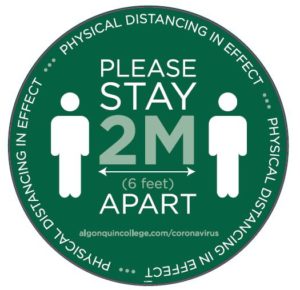
There has never been a start to a school year like the one we are experiencing this fall at Algonquin College’s Pembroke Waterfront Campus. The campus is eerily quiet as few students are in the building, most are receiving their training in a virtual learning environment where faculty have adapted the way they teach course content in this pandemic adjusted world we are living in.
Enrolments are in fact strong, approaching 1,000 students in the 19 full-time programs that are being offered at the campus. Many programs were waitlisted as they filled up during the summer months, a strong indicator that students did not put their lives on hold and followed through with their commitment to obtain post-secondary credentials.

Like the students, most college employees are working from home. Over the past few months, both faculty and student support staff have done a remarkable job creating virtual support systems to help students succeed. The creativity, ingenuity and perseverance of the college staff have been inspiring, and through this pandemic, much has been learned about how technology can enable enhanced learning for students.
Of course, there are some things that can not be taught online, and so safety mitigation plans have been put in place to allow students in specialized classes to come on campus or participate in field trips. Examples include carpentry shop classes or outdoor skills training for Arborist students who need to learn the art of tree climbing.
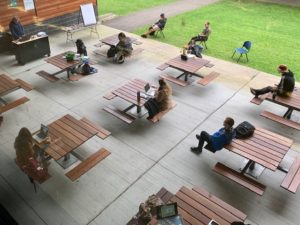 The College has imposed strict safety guidelines such as the requirement that masks be worn on campus, that all students and employees complete an online health and safety COVID-19 course and that faculty take student attendance. Additional measures such as enhanced cleaning, the removal of furniture to ensure physical distancing and the closure of some common spaces with a shift to more virtual services have also been foundational in the college’s approach to keeping its students and staff safe.
The College has imposed strict safety guidelines such as the requirement that masks be worn on campus, that all students and employees complete an online health and safety COVID-19 course and that faculty take student attendance. Additional measures such as enhanced cleaning, the removal of furniture to ensure physical distancing and the closure of some common spaces with a shift to more virtual services have also been foundational in the college’s approach to keeping its students and staff safe.
A walk through the campus this fall is a very different experience. Gone is the buzz of excitement that comes with the start of a school year where orientation activities bring students together. That’s been replaced by virtual learning and social spaces using technology like Zoom, but through this unprecedented situation, students, faculty and staff are adjusting, understanding we may be in this situation for a while.
Former New York Yankees catcher Yogi Berra often left people confused with his creative sayings, but this one seems to hit the mark. “No one goes there nowadays, it’s too crowded.” People are trying to stay within their social bubbles, trying to stay safe, but also trying to live as normal a life as possible. Making personal connections has never been more difficult.
Across the nation, post-secondary schools have had to adjust to this new reality. Higher education will remember 2020 as a year of disruption, however, history may show that the pandemic was also a transformational time for the sector. Never before have colleges pivoted so quickly and intentionally, keeping the focus on student success and academic instruction.
Berra would say, “If you see a fork in the road, take it.” Colleges have certainly done this, and while many students and employees long for the day when classes return to traditional classrooms, the pandemic has made it necessary to shift the way education is delivered. Students still have a timetable and still receive lessons from their faculty while spending time together in scheduled classes, but the bricks and mortar has been replaced by a computer screen. 2020 is certainly a new world.
Posted by Jamie Bramburger, Manager of Community and Student Affairs
Posted on Wednesday, September 9th, 2020
Student Support Services Highlight: Want help with managing your coursework and work at home? Want to be better organized but not sure how to get started? #DidYouKnow that Shelly Sutherland, Student Success Specialist, can help you?!
Learn more about how your Student Success Specialist can be your GPS to success.
Posted on Monday, August 31st, 2020
The days are getting shorter and soon the leaves on the trees will be changing colours. Fall is always a wonderful time of the year at and Algonquin College’s Waterfront Campus in Pembroke we are looking forward to starting classes. Whether your student is a new first-year student at our Pembroke Waterfront Campus, or a returning student eager to return to their studies, our fall semester is going to be jam-packed with learning and community building activities!
Our dedicated Parents’ and Families website features links to blogs, interesting articles written by our Student Services staff, and a calendar that notes some important upcoming dates.
Our goal is to keep you informed. While we respect the privacy of our students, the information we will provide in this newsletter will give you a good sense of what is happening on campus and virtually throughout the year and will provide you with enough information to have engaging conversations with your student.
Algonquin College has responded to the COVID-19 pandemic by moving the majority of its programming and services to a virtual learning environment. This has been done with safety in mind for our students and employees. In some cases, programs will be offering in-person instruction where it is necessary and where health and safety protocols have been put in place.
Information on how programs will deliver curriculum in the Fall term has previously been shared with students via email. The next important step for students is to attend their virtual orientation sessions to meet their program coordinator and classmates and to learn more about how the Fall semester will unfold. Parents are encouraged to review the College’s COVID-19 website to stay informed on the College’s approach to teaching and learning during the pandemic. Learn more.

An opportunity for your student to get ready, get connected, and get excited.
Before classes start on September 8, 2020 encourage your student to participate in their virtual AC Start Orientation on Thursday, September 3 or Friday, September 4 depending on which program your student is enrolled in.
The new student session starts at 8:30 a.m. sharp online. This virtual orientation is very important and we strongly recommend that you encourage your student to make the time to attend so that they can start class on September 8th prepared and confident. We also have a parent orientation session too at 9 a.m. each day!

We know that you and your student have many questions. Below are some links that will direct you to the answers to your questions in advance of AC Start Orientation:
All of these questions and more can be answered on our FAQ: Campus Services page.
Plus, we have created a helpful Return to Campus web resource to support students as they transition into the Fall Term. We strongly recommend that parents also explore the resources provided:
Whether your student is studying 100% remotely this fall or studying with a combination of remote and on-campus program delivery, they have the opportunity to access all of our services. Learn more.
The Fall Bursaries are now open for application on the Algonquin College Student Information System (ACSIS) from August 24 to October 5, 2020. Encouraged your student to apply! Learn more.
If you have dental and health coverage for your student, your student can opt-out of the college’s insurance plan. However, this must be done within the first few weeks of classes. Withdrawing from the insurance program is easy. Your student just has to go onto the insurance plan website and complete a form. The money that was paid to the college for the insurance plan will then be reimbursed into their bank account.
Have your student visit wespeakstudent.com and complete the opt-out form.
 Keep in touch if your student has re-located to Pembroke for their college program. Quick texts or phone calls to ask how things are going will help you get a feel for how they are adjusting to college life and their program of study.
Keep in touch if your student has re-located to Pembroke for their college program. Quick texts or phone calls to ask how things are going will help you get a feel for how they are adjusting to college life and their program of study.We have a number of events on campus, both faculty and staff-driven and student organized. Sometimes it’s hard to keep track of everything that is happening, which is why we have created the Waterfront Campus Events Calendar.
Learn more about the social and academic event opportunities available for our students.
Awareness is key! As your student settles into their new schedules, many are starting to see the need to maintain their mental wellness. We are offering a number of programs to help with that and we encourage them to take part.
Did you know, all Student Support Services staff at the Waterfront Campus are trained in Mental Health First Aid, as well as almost all of our faculty and administrators? Learn More >>
We welcome your feedback on your newsletter for parents and families.
Thank you for being part of your young adult’s post-secondary journey.
Sincerely,
Jamie Bramburger
Manager of Community and Student Affairs
Algonquin College Waterfront Campus, Pembroke, ON.
PM-Parents@algonquincollege.com
Posted on Sunday, August 23rd, 2020
 Attention all new and returning Waterfront Campus students!
Attention all new and returning Waterfront Campus students!The Fall Bursaries are now open for application on your Algonquin College Student Information System (ACSIS) from Aug. 24 to October 5, 2020. You are encouraged to apply!
Students can apply for all in-year bursaries administered by Algonquin College by submitting one application!
The application cycle is open once per term (Fall, Winter, Spring). Only registered students for the current term can apply online through the ACSIS, Bursary Portal.
Applying for a bursary does not guarantee acceptance, as the number of applicants can often surpass the bursary funds available. When this occurs, applicants are chosen based on the highest amount of financial need. Bursary applications received after the deadline will not be accepted.
Students awarded a bursary are required to have their Social Insurance Number (SIN) registered on the college system for income tax purposes. If you do not have your SIN registered with the college when you submit your application, an email notification will be sent to you with instructions.
Posted on Thursday, August 20th, 2020
The student voice always matters at post-secondary schools. Hearing what students have to say is what drives decision making and at Algonquin College the voice of its students has been effectively heard for the past five decades through its student leaders. This year the Algonquin Students’ Association is marking a very special milestone as it celebrates its 50th anniversary.
Founded in 1970, just three years after the Ontario college system was launched and Algonquin College got its start, the Association has lived up to its mission to create an environment that inspires a passion for student success. While the directors have changed over the years, the student leaders who have represented the student body have been true to the mission, continually aspiring to leave the College a bit better for the next group of students who come behind them.
At the Pembroke Campus, there is no greater example of the Students’ Association commitment to students than its bold move in 2008 to commit $4-million towards the building of a new Waterfront Campus along the shores of the Ottawa River. What made this extraordinary financial gift so significant was not only the amount of funding that was being put forward by the students but also the fact the commitment was being made before the College’s Board of Governors had officially approved the project for construction.
For many years the Students’ Association had heard from students at the former Pembroke Campus that they wanted recreational and sports facilities on campus, but with an aging building and no room for expansion, there was no opportunity to respond to this request. When momentum built to construct a new campus the Association jumped at the opportunity to throw its full support behind the project, making public its plans to help fund a gymnasium, fitness centre and student lounge that would create more social space for students.
There is no question the public declaration was highly influential in the ultimate decision made a few months later by the Board of Governors to approve the building of the new campus, with or without any government funding. The $36-million campus opened amidst much fanfare in the Fall of 2012. It was a proud moment for everyone involved, including the Students’ Association, but the S.A. wasn’t done yet.
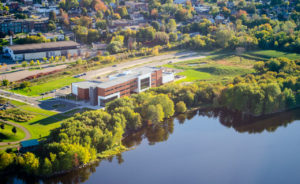
In the winter of 2020, the Students’ Association again responded to student requests by installing a rock climbing wall in the gymnasium. With a significant out-of-town student population and some of the most unique outdoor adventure programs in the college system, the climbing wall is a perfect fit for the Pembroke Campus. It has been very well received and has created more opportunities for students to literally “hang out.”
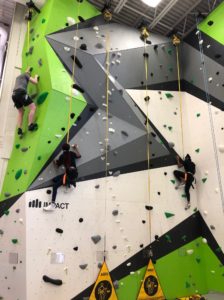
Over the years the Students’ Association has expanded its facilities and services at all three Algonquin College campuses. The Association continues to invest in college infrastructure and services that go beyond the classrooms. Soon, the S.A. will open a new athletics facility at its Ottawa Campus, another example of its leadership in providing some of the top athletic facilities in the country.
The Students’ Association has had a great run for the past five decades. Given its track record, it’s certain that the next 50 years will produce more great moments for the organization and ultimately the students who choose to study at Algonquin College.
Posted by: Jamie Bramburger, Manager of Community and Student Affairs
Posted on Wednesday, July 22nd, 2020
In the spring of 1975, the final graduating class from Pembroke’s Lorrain School of Nursing was celebrated. In a parting message to the more than 40 graduates the convocation booklet offered this passage, “Life is a dynamic and constantly changing process in which we must all change with the times. Gone is the day of the independent nursing school. Now our mode of education has changed to that of the Community College, in an effort to standardize and improve nursing education throughout the province. We are now known as Algonquin College Health Sciences Division-Lorrain.”
It was the end of an era. The Lorrain School of Nursing has been operating since 1916. It had been founded by Sister St. Elizabeth of the Catholic Church, operating out of the Pembroke General Hospital. In 1926, the school was transferred to the administration of the Grey Sisters of the Immaculate Conception, who continued to operate it until that final graduating class in 1975. In its 58 year history, the school turned out hundreds of nursing graduates, most of whom were hired to work in Pembroke’s two hospitals, the General and the Civic hospital which closed in the 1990s as part of Ontario’s hospital restructuring mandate.
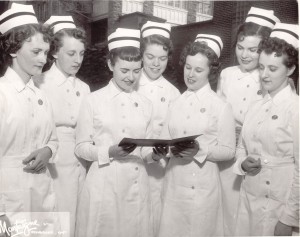
The decision to move all nursing education into the fledging Ontario college system was not unexpected. It had been rumoured for some time and took hold when the architect of the province’s new college training system moved into the Premier’s seat at Queens Park.
Bill Davis had served as Premier John Robarts’ education minister. In the mid-1960’s he was tasked with overhauling the model of vocational schools that had existed in Ontario for many years and replacing them with a province-wide publicly funded network of Colleges that would support the training and re-training requirements of the province’s industries.
In 1967, the college system was founded with large urban colleges established in most of Ontario’s major cities, and many regional smaller campuses in geographical locations that could support a post-secondary institute. Pembroke was one of those communities, the campus becoming an extension of Algonquin College in Ottawa.
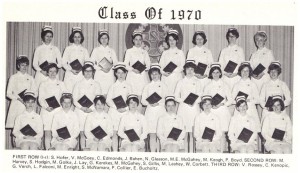
When Davis succeeded Robarts as Ontario’s Premier in 1971 he set his sights on bringing health care training into colleges, particularly nursing which for decades had been delivered through hospitals, divided on religious lines, with both protestant and Catholic nursing schools operating under the hospital administration. Such was the case at the Lorrain School of Nursing where Gisele Shields earned her nursing diploma and immediately upon graduating in 1960 joined the faculty as a clinical instructor for nursing students.
Shields had grown up in Westmeath, a farming community near Pembroke. After graduating from high school she made a quick decision to become a nurse. “I had three choices-a secretary, a nurse or a teacher. I didn’t have a clue what I wanted to do but one day in high school I was asked to go to Cathedral school to supervise a grade three class. I couldn’t control the kids and that’s when I decided to apply to the nursing program at Lorrain,” says Shields.
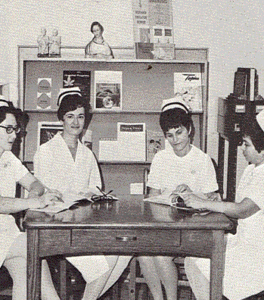
(Photo of Nursing faculty at Lorrain School of Nursing. L to R: Mary McBride, Myra Sloan, Gisele Shields, Laura Quiat-all of whom transferred to Algonquin College)
Shields says the transition from the Lorrain School to the College wasn’t an easy adjustment for the faculty. The College came with a new set of operating rules and when the Lorrain staff transferred to the Pembroke Campus the building wasn’t ready for them. “They were still doing construction. We had to wear hard hats to go to our classrooms,” says Shields, but as time evolved, the faculty adjusted to their new surroundings and their expertise helped the campus get off on the right foot as it started to build what is now an excellent reputation for training nurses.
Shields has the distinction of being the only Algonquin College nursing teacher to have taught every student who enrolled in the Diploma nursing program from 1974 through 2003 when the Diploma Nursing program was phased out and replaced with the Bachelor of Science in Nursing four-year degree program. She retired at age 65, many years removed from her reluctant choice to attend the Lorrain School to become a nurse, a decision that resulted in a teaching career that spanned more than four decades.
Reflecting on her career, Shields fondly remembers the Lorrain School of Nursing. She remembers having only one day off a week because student nurses were expected to take shifts at the hospital and to live in dorms that were provided by the school. During her time as a student, there was no tuition payment required, but students did have to cover their uniform and book costs. They earned a $15 stipend each month for their work at the hospital.
It was a lot of responsibility for new nursing students. “ I can remember making rounds every hour and making sure everyone was breathing,” quips Shields. “We always had a third-year student with us and they knew the ropes. There was a lot of responsibility on all of the students. That’s why we didn’t pay tuition, because we provided a service to the hospital” says Shields.
It’s now been 60 years since Shields graduated. Over that time she has stayed connected with her graduating class, a group that has maintained a tradition of holding a reunion every five years. “Residence was probably the best time of my life. We worked hard. We played hard. We made friendships that lasted a lifetime,” says Shields.
In one of the three nursing labs at Algonquin College’s Waterfront Campus, there is a plaque acknowledging the financial gift made by the Grey Sisters of the Immaculate Conception in helping to fund the lab when the campus opened in 2012. It is a reminder of how the Lorrain School of Nursing is part of Algonquin’s rich history in training nurses.
Posted by Jamie Bramburger, Manager of Community and Student Affairs
Posted on Wednesday, July 15th, 2020
We hope that you and your families are well, enjoying the warm summer evenings and taking some time to stay connected because the fall semester is right around the corner! Whether your student is a new first-year student at our Pembroke Waterfront Campus, or a returning student eager to come back to the shores of the Ottawa River, our fall semester is going to be different from any other fall semester we have experienced as a result of our new reality. That is why we wanted to connect with you and share some important details that will help you support your student during these unprecedented times.
Our goal is to keep you informed. While we respect the privacy of our students, the information we will provide in this newsletter will give you a good sense of what is happening on campus throughout the year and will provide you with enough information to have engaging conversations with your student.
Information on program delivery format has been shared with all students. Some programs will be delivered fully remotely while others will be a combination of remote and on-campus instruction. What does remote delivery mean? It means that students will take part in real-time classes where professors will guide your student’s learning in an online environment. Details on specific-program delivery can be found on our program pages, algonquincollege.com/pembroke/program.
For our students who will be on-campus for some classes during the Fall 2020 term, we want to ensure that they have the resources to feel comfortable with their transition to our campus either for the first time or as a returning student. We have developed a Return to Campus portal for students to have their questions answered and to provide resources and tools. Learn More.

Orientation is your student’s introduction to all things Algonquin College – Pembroke Waterfront Campus. Our resources and events will build their support network and set them up for success. Students can kick-off their college experience with Online Prep and Workshop during July and August. Our virtual workshops and social activities are an opportunity for your student to make connections with fellow students, employees, and create community. What’s really great is that you can participate too if you like!
Students will get orientated to their program during Virtual AC Start Orientation on Thursday, September 3 or Friday, September 4 depending on which program they are coming into.
Full details on all orientation activities can be found here, algonquincollege.com/pembroke/orientation.
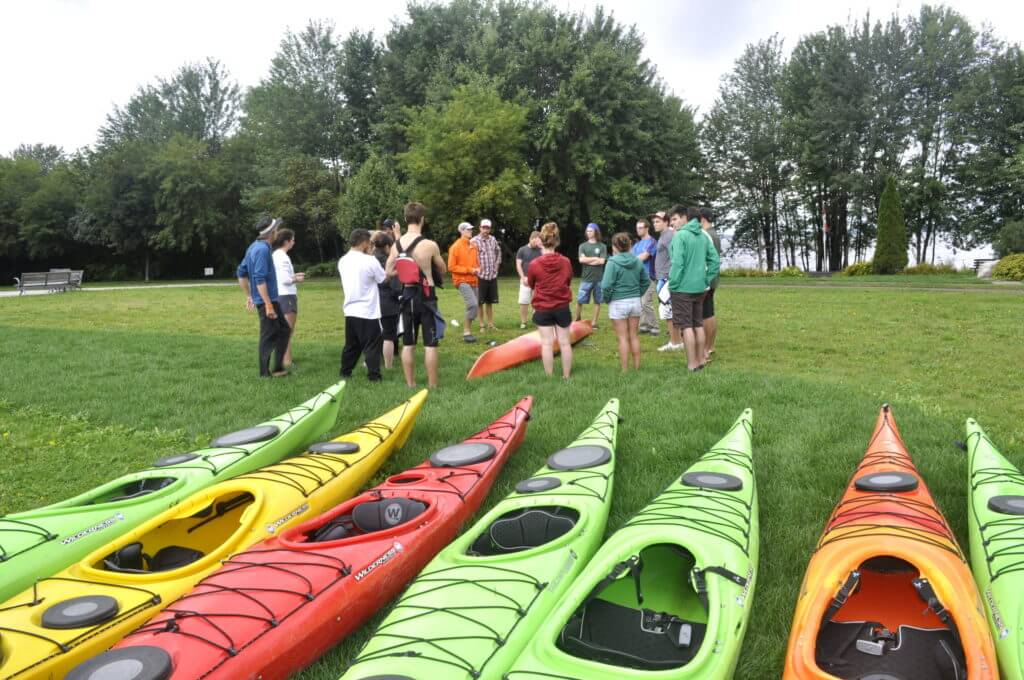
It is hard to believe it but it is the 20th anniversary of our Outdoor Adventure program! We have created a site dedicated to celebrating the program’s inception and longstanding partnership with Wilderness Tours.
Learn More.
We are committed to student success and ask that your student complete a very important pre-admission survey, known as the College Student Inventory™ Survey. We use the results of this survey to identify areas where we can connect your students with programs and services that may interest them, plus, they have a chance to win $500 towards their tuition simply by completing the survey! It is very important that your student complete this survey on their own.
Students who have paid their tuition deposit, tuition, or done a fee deferment can complete the survey now!
Complete Survey.
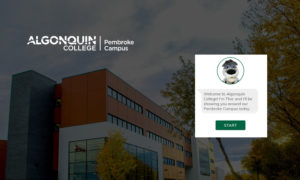 Campus Tours
Campus ToursNot all students and families have had a chance to visit our beautiful Pembroke Waterfront Campus along the shores of the Ottawa River. We have several ways for you and your student to experience first-hand the advantages of studying at a smaller campus where we offer our students exceptional learning opportunities and a friendly, supportive environment – all from the comfort of your home!
Learn More.
Did you know that we have a Facebook group for new Algonquin College Pembroke Campus students starting in the fall? We invite all new students to join, introduce themselves and meet their fellow classmates!
We hope this newsletter has been helpful. Please keep in touch with us and offer us feedback on topics you would like us to cover in future newsletters.
Thank you for being part of your young adult’s post-secondary journey.